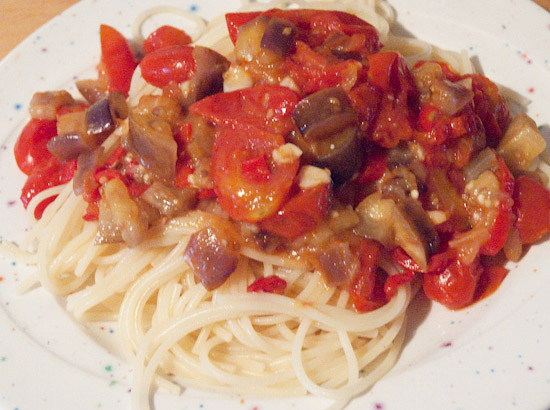
Eggplant cooking - pasta with eggplant and tomato
|
|
I don't like eggplant but had eaten really delicious eggplant dishes a few times. And those few dishes that I really enjoyed were all cooked this way.
So even though I had not considered using eggplant in a pasta sauce, my first reaction when I came across one such recipe was “Why not?"
After all, eggplant is very much a part of Italian cuisine and it doesn't take much to create a soft and mushy pasta sauce with it. Cooking eggplant over a medium fire, for about 15 minutes or longer, is all that is required.
Below is a very simple eggplant and tomato sauce recipe that can be done in minutes.
However, you should also set aside time for soaking the eggplant in salted water, see notes on eggplant cooking below).
Treating eggplant with salt - either soaking in salted water or rubbing the eggplant with salt and leaving it to stand - is important for neutralising some of its mildly toxic chemicals. Likewise it is important to eat only cooked eggplant and not raw.
For more discussion on the importance of cooking eggplant, see my article about the raw food diet/
Pasta with eggplant and tomato sauce
- 3 tbsp extra virgin olive oil
- 3 medium eggplants (about 400 grams), cut into small cubes
- about 400 grams cherry tomatoes, cut into halves
- 4 cloves garlic, crushed
- 1/2 tsp sea salt
- pepper to taste
- coriander or other herb for garnish
- grated parmesan for topping
- 300 grams pasta, cooked according to instructions.

Method:
- Cut the eggplant into cubes and soak in heavily salted water for about 20 minutes.
- Heat the olive oil in a heavy pan. Add the garlic and fry for about two minutes, until fragrant.
- Add tomatoes and eggplant. Reduce heat to medium and simmer for 20 minutes or longer.
- Serve over cooked pasta. If you wish, garnish with coriander and top with sprinkled parmesan.
Variations:
The above is just a very basic pasta sauce using eggplant and tomatoes as a base. Feel free to add one or two other vegetables, such as mushrooms, capsicum, zuchinni, etc.
And while this is presented as a vegetarian pasta dish, feel free to add bacon, sausage or other meats if you are not vegetarian.
| Notes on eggplant cooking:
1. Eggplants vary in size from about the size of golf balls (or even smaller) to that of water melons. So it is not really meaningful when recipes for eggplant cooking call for, say, 3 medium eggplants. Use common sense for gauging the amounts. 2. After you have cut or sliced the eggplant, it is a good idea to salt them or soak in heavily salted water for about 20 minutes. This will draw out some of its sap (which is mildly toxic) and remove its bitterness. 3. Eggplant - along with tomato, potato and bell peppers - belong to the deadly nightshades family of plants. They are mildly "poisonous". You won't die from eating them, of course, but excessive amounts eaten on a regular basis can produce inflammation-related problems, such as arthritis. 4. From the macrobiotic perspective, nightshade plants are extremely yin or "expanded" - soft, loosely structured, juicy. spongy, etc. This yin energy can be neutralised to some extent by cooking, especially strong cooking like grilling, or long slow cooking. Hence, eggplant cooking is important. Never eat raw eggplant! |
|
|
New! Comments
Have your say about what you just read! Kindly leave a comment in the box below.